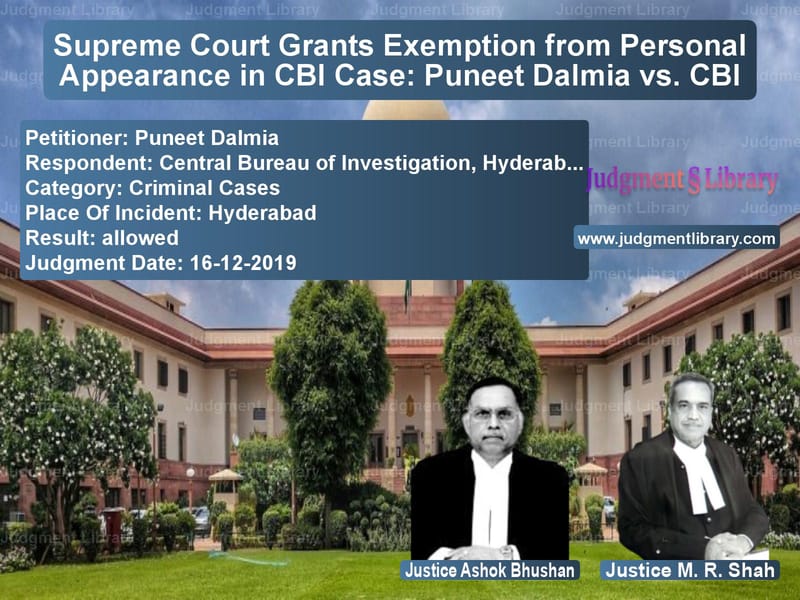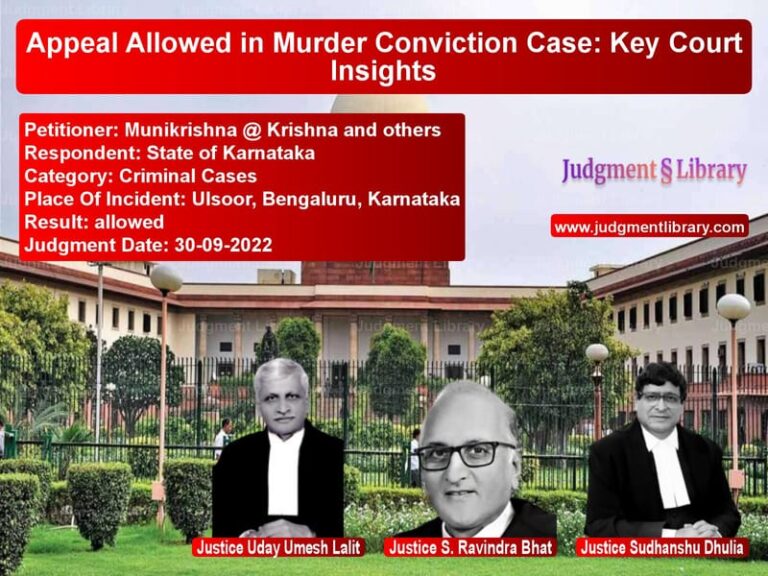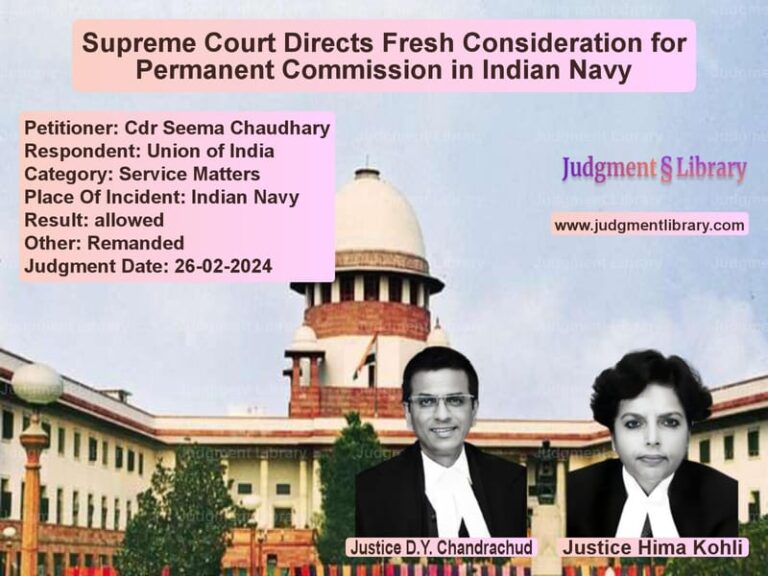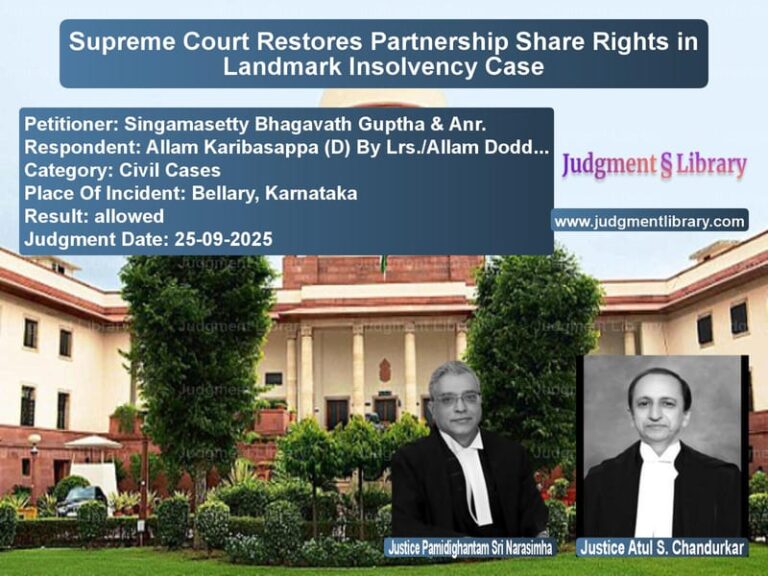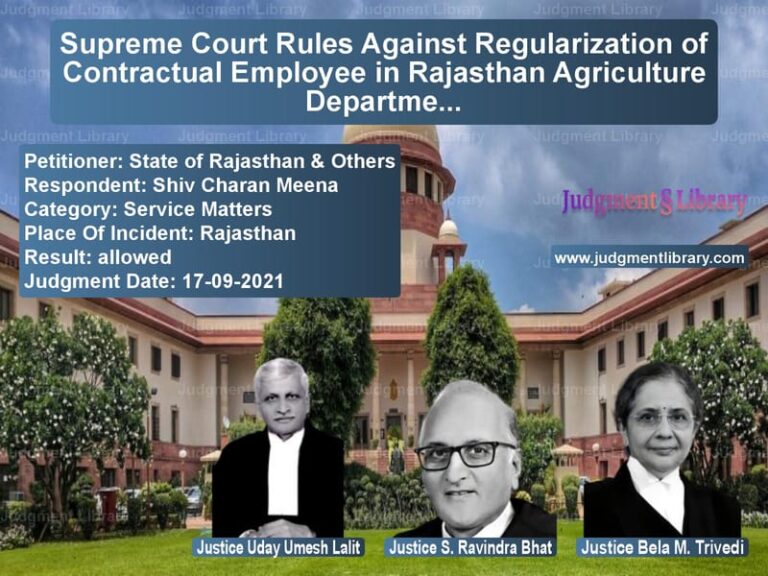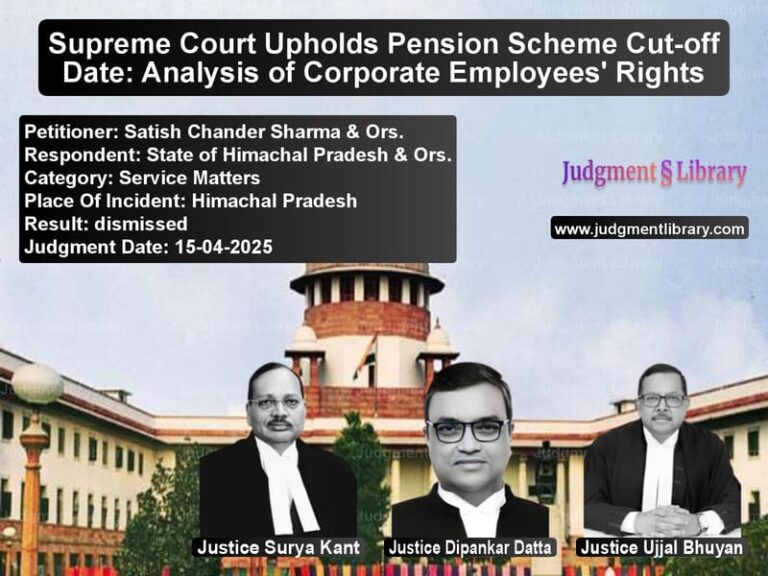Supreme Court Grants Exemption from Personal Appearance in CBI Case: Puneet Dalmia vs. CBI
The Supreme Court, in the case of Puneet Dalmia vs. Central Bureau of Investigation (CBI), Hyderabad, ruled on an important issue regarding exemption from personal appearance in criminal trials. The judgment addresses the balance between ensuring the presence of an accused in a criminal case and the undue hardship caused by frequent court appearances.
Background of the Case
Puneet Dalmia, the appellant, was accused in a case registered by the Central Bureau of Investigation (CBI), Hyderabad, under charges of conspiracy, cheating, and corruption. He was named as Accused No. 3 in charge-sheet C.C. No. 12 of 2013, pending before the Special CBI Court in Hyderabad. The trial court had directed him to appear before the court every Friday, following an earlier bail order granted on 07.06.2019.
The appellant submitted that appearing in Hyderabad every Friday caused undue hardship since he was based in Delhi and held executive positions in multiple companies. Due to the long travel requirements and business responsibilities, he sought exemption from personal appearance under Section 205 of the Criminal Procedure Code (Cr.P.C.).
Legal Issues Before the Supreme Court
- Whether an accused facing serious economic offenses can be granted exemption from personal appearance.
- Whether personal attendance on every hearing was necessary or if representation through counsel was sufficient.
- Whether the High Court erred in denying the exemption despite the appellant’s willingness to cooperate in the trial.
Arguments by the Appellant (Puneet Dalmia)
- The appellant had been attending the trial court every Friday since 2013, without delaying the trial.
- Traveling from Delhi to Hyderabad weekly caused extreme hardship and financial loss.
- He was willing to furnish an undertaking that his non-appearance would not delay the trial, and his counsel would represent him in every hearing.
- Other accused in the same case had been granted permanent exemption from personal appearance.
Arguments by the Respondent (CBI)
- The charges against the appellant were serious, involving offenses under Sections 120-B, 420, and 409 of the IPC, and Sections 9, 12, 13(2) read with 13(1)(c) and (d) of the Prevention of Corruption Act.
- The High Court rightly denied exemption, as the presence of the accused ensured cooperation in the trial.
- There was a possibility that if exemption was granted, the trial could be further delayed.
Supreme Court’s Judgment
The Supreme Court ruled in favor of the appellant and granted him exemption from personal appearance in the trial court, subject to conditions.
- The Court noted that the appellant had appeared before the trial court every Friday since 2013 without attempting to delay proceedings.
- It relied on the principle in Bhaskar Industries Ltd. vs. Bhiwani Denim & Apparels Ltd. (2001) and Rameshwar Yadav vs. State of Bihar (2018), where the Court held that personal attendance can be dispensed with if an accused is represented by counsel and undertakes not to delay the trial.
- The Court observed that the accused should not suffer undue hardship and inconvenience due to frequent appearances.
- The Court also noted that other accused in the same case had been granted exemption.
The judgment stated:
“If a court is satisfied that in the interest of justice, the personal attendance of an accused need not be insisted upon, then the court has the power to dispense with attendance. The presence of an accused should not be required merely for marking attendance if the trial can progress in his absence.”
The Court further held:
“The purpose of personal appearance is to ensure that the accused does not evade trial. If the accused is represented by counsel and has no objection to evidence being recorded in his absence, such relief can be granted.”
Final Decision
- The Supreme Court set aside the orders of the High Court and trial court.
- The appellant was granted exemption from personal appearance, subject to the following conditions:
- He must provide an undertaking that he will not dispute his identity in the case.
- His counsel must appear on his behalf at all hearings, and no adjournments shall be sought on his behalf.
- He must appear for framing of charges and whenever directed by the trial court.
- If his counsel fails to appear or causes delay, the trial court may revoke the exemption and direct his personal attendance.
Key Takeaways from the Judgment
- Personal attendance can be dispensed with if an accused cooperates and is represented by counsel.
- The decision ensures that business executives and professionals facing criminal charges are not unduly burdened.
- The ruling clarifies that exemption is not an escape from trial but a procedural relief to ensure efficiency.
- The trial court retains the power to recall the accused if the exemption is misused.
This judgment is a landmark decision reinforcing the principle that personal appearance in a criminal trial should not be insisted upon if it does not serve the cause of justice.
Petitioner Name: Puneet Dalmia.Respondent Name: Central Bureau of Investigation, Hyderabad.Judgment By: Justice Ashok Bhushan, Justice M. R. Shah.Place Of Incident: Hyderabad.Judgment Date: 16-12-2019.
Don’t miss out on the full details! Download the complete judgment in PDF format below and gain valuable insights instantly!
Download Judgment: Puneet Dalmia vs Central Bureau of In Supreme Court of India Judgment Dated 16-12-2019.pdf
Direct Downlaod Judgment: Direct downlaod this Judgment
See all petitions in Bail and Anticipatory Bail
See all petitions in Money Laundering Cases
See all petitions in Fraud and Forgery
See all petitions in Extortion and Blackmail
See all petitions in Attempt to Murder Cases
See all petitions in Judgment by Ashok Bhushan
See all petitions in Judgment by Mukeshkumar Rasikbhai Shah
See all petitions in allowed
See all petitions in supreme court of India judgments December 2019
See all petitions in 2019 judgments
See all posts in Criminal Cases Category
See all allowed petitions in Criminal Cases Category
See all Dismissed petitions in Criminal Cases Category
See all partially allowed petitions in Criminal Cases Category

